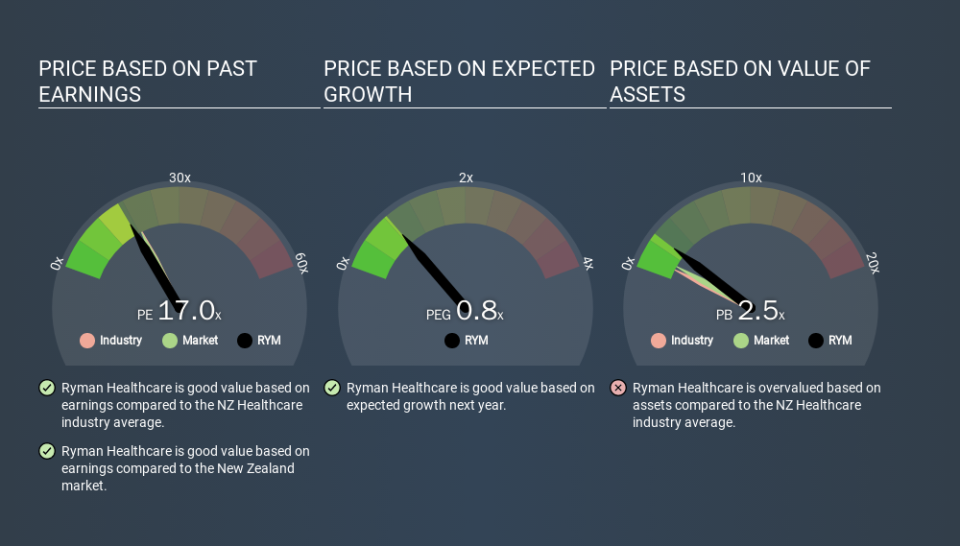What Is Ryman Healthcare's (NZSE:RYM) P/E Ratio After Its Share Price Tanked?

Unfortunately for some shareholders, the Ryman Healthcare (NZSE:RYM) share price has dived 31% in the last thirty days. Indeed, the recent drop has reduced the annual gain to a relatively sedate 2.2% over the last twelve months.
All else being equal, a share price drop should make a stock more attractive to potential investors. In the long term, share prices tend to follow earnings per share, but in the short term prices bounce around in response to short term factors (which are not always obvious). So, on certain occasions, long term focussed investors try to take advantage of pessimistic expectations to buy shares at a better price. Perhaps the simplest way to get a read on investors' expectations of a business is to look at its Price to Earnings Ratio (PE Ratio). A high P/E implies that investors have high expectations of what a company can achieve compared to a company with a low P/E ratio.
Check out our latest analysis for Ryman Healthcare
Does Ryman Healthcare Have A Relatively High Or Low P/E For Its Industry?
We can tell from its P/E ratio of 16.97 that sentiment around Ryman Healthcare isn't particularly high. We can see in the image below that the average P/E (18.8) for companies in the healthcare industry is higher than Ryman Healthcare's P/E.
Ryman Healthcare's P/E tells us that market participants think it will not fare as well as its peers in the same industry. Since the market seems unimpressed with Ryman Healthcare, it's quite possible it could surprise on the upside. If you consider the stock interesting, further research is recommended. For example, I often monitor director buying and selling.
How Growth Rates Impact P/E Ratios
If earnings fall then in the future the 'E' will be lower. That means even if the current P/E is low, it will increase over time if the share price stays flat. Then, a higher P/E might scare off shareholders, pushing the share price down.
Ryman Healthcare shrunk earnings per share by 2.9% last year. But over the longer term (5 years) earnings per share have increased by 9.0%. And over the longer term (3 years) earnings per share have decreased 1.4% annually. So you wouldn't expect a very high P/E.
Don't Forget: The P/E Does Not Account For Debt or Bank Deposits
It's important to note that the P/E ratio considers the market capitalization, not the enterprise value. In other words, it does not consider any debt or cash that the company may have on the balance sheet. Theoretically, a business can improve its earnings (and produce a lower P/E in the future) by investing in growth. That means taking on debt (or spending its cash).
Such expenditure might be good or bad, in the long term, but the point here is that the balance sheet is not reflected by this ratio.
Ryman Healthcare's Balance Sheet
Net debt is 26% of Ryman Healthcare's market cap. While that's enough to warrant consideration, it doesn't really concern us.
The Verdict On Ryman Healthcare's P/E Ratio
Ryman Healthcare has a P/E of 17.0. That's below the average in the NZ market, which is 18.6. Since it only carries a modest debt load, it's likely the low expectations implied by the P/E ratio arise from the lack of recent earnings growth. Given Ryman Healthcare's P/E ratio has declined from 24.5 to 17.0 in the last month, we know for sure that the market is significantly less confident about the business today, than it was back then. For those who don't like to trade against momentum, that could be a warning sign, but a contrarian investor might want to take a closer look.
Investors have an opportunity when market expectations about a stock are wrong. As value investor Benjamin Graham famously said, 'In the short run, the market is a voting machine but in the long run, it is a weighing machine. So this free report on the analyst consensus forecasts could help you make a master move on this stock.
You might be able to find a better buy than Ryman Healthcare. If you want a selection of possible winners, check out this free list of interesting companies that trade on a P/E below 20 (but have proven they can grow earnings).
If you spot an error that warrants correction, please contact the editor at editorial-team@simplywallst.com. This article by Simply Wall St is general in nature. It does not constitute a recommendation to buy or sell any stock, and does not take account of your objectives, or your financial situation. Simply Wall St has no position in the stocks mentioned.
We aim to bring you long-term focused research analysis driven by fundamental data. Note that our analysis may not factor in the latest price-sensitive company announcements or qualitative material. Thank you for reading.

 Yahoo Finance
Yahoo Finance 
